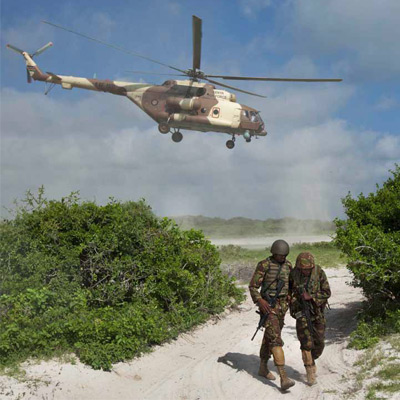
If the first decade of the new millennium bears a single enduring political lesson, it is this: Intervention strategies that plan the war but not the peace will fail. Indifference to or wishful thinking about the crafting of a post-intervention political order guarantees disorder, and can leave both the occupied country and the intervening power worse off than before.
Kenya risks this fate in southern Somalia, where its armed forces are currently engaged in an operation against the jihadi group al-Shabaab in the Jubbaland border region. Almost three months into the offensive, which has at times been bogged down in a combination of rainy season mud and political indecision, there is still little indication that Kenya or anyone else has a viable plan for who will govern this highly unstable and contested region if and when Shabaab is ousted. Unless this question is clearly and effectively addressed Kenya is not likely to get what it wants—a more stable and secure border area. Instead, its offensive could produce destabilizing clan clashes over the seaport of Kismayo. Aggrieved clans and communities could turn to Shabaab, reinvigorating a jihadi group in crisis. And the consequences of this combination of developments are likely to spill over into Kenya, affecting both the troubled border area and the Kenyan capital, Nairobi. The stakes are exceptionally high for Kenya, which has much to lose if this operation fails.
For Kenya the immediate and essential goal is the establishment of a more friendly Somali political order in the remote pastoral areas along Kenyan-Somali border. This is the only objective Kenya’s openly divided government appears to agree on. For the United States and other countries—including Kenya—ousting Shabaab from the seaport of Kismayo would be an optimal counterterrorism outcome as well, though at times over the past two months some Kenyan officials have expressed ambivalence about this goal, while some U.S. officials entertained doubts about the Kenyan offensive from the outset. But for most Somalis the pivotal issue will be not so much driving Shabaab out as which groups will subsequently gain control of Kismayo whenever and however Kismayo falls to an anti-Shabaab force. This is the danger, as Kismayo has been a chronically contested city since 1991.
Past approaches to determining who rules Kismayo—either via a victor’s peace by one group or the cobbling together of an unstable, clan-based coalition controlling the city—have consistently failed. A post-Shabaab Kismayo political order will require “realistic visionaries” who can forge a more cosmopolitan future for the coveted seaport, one in which the rights of all Somalis—not just the most powerful local clans—to live, own property, and pursue livelihoods is clearly spelled out.
This paper highlights the urgent need to initiate Somali dialogue toward a “Kismayo solution” before the city changes hands, and argues that a successful Somali dialogue on rights and claims on Kismayo could serve as a model for other contested Somali urban areas.

